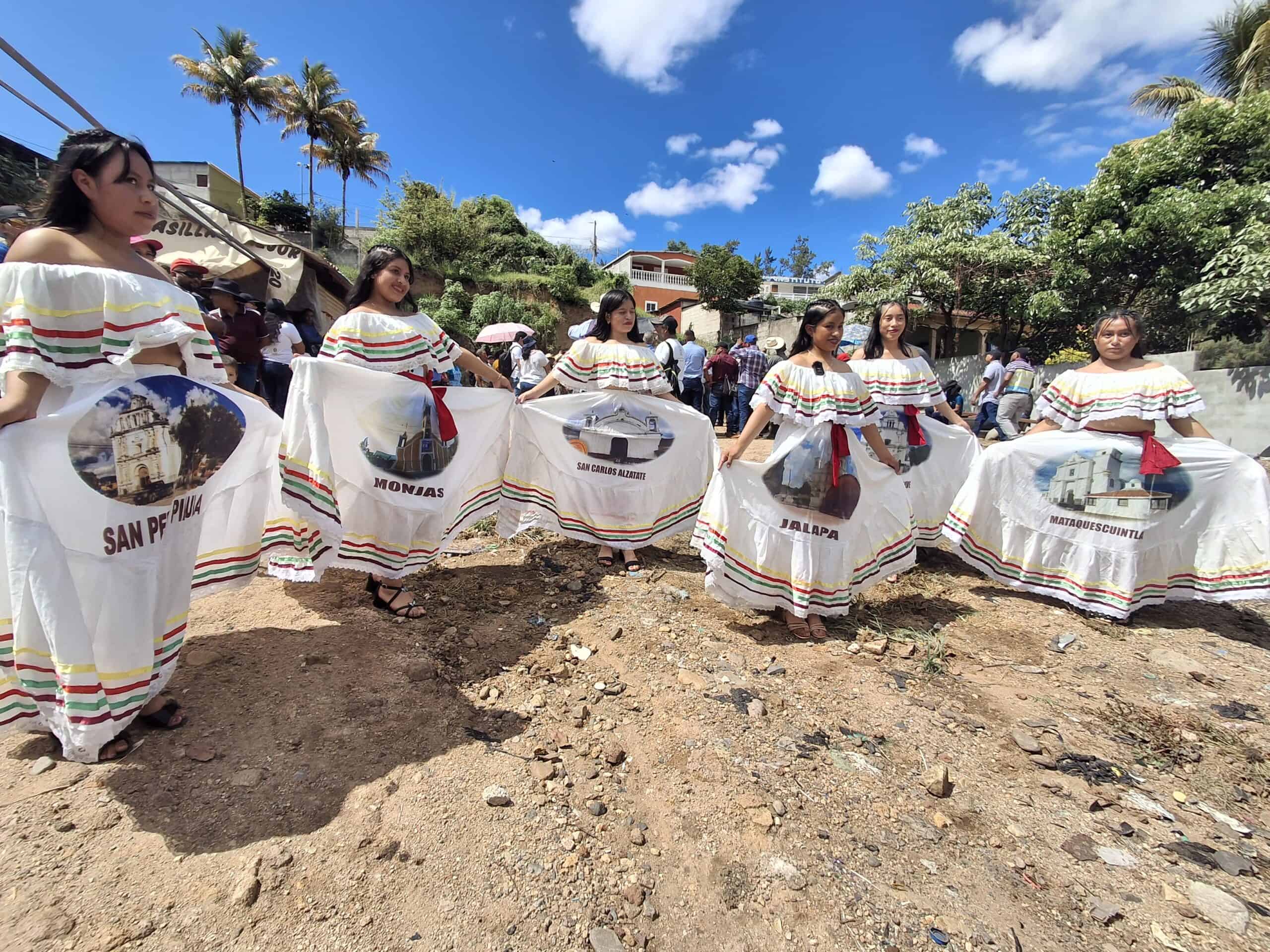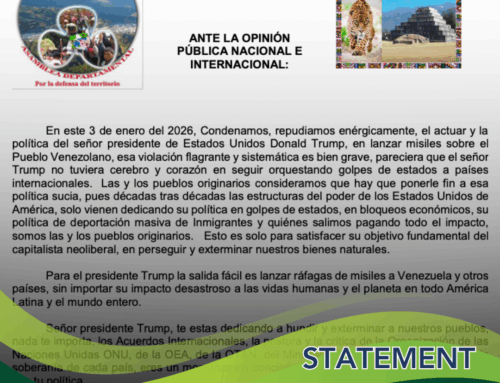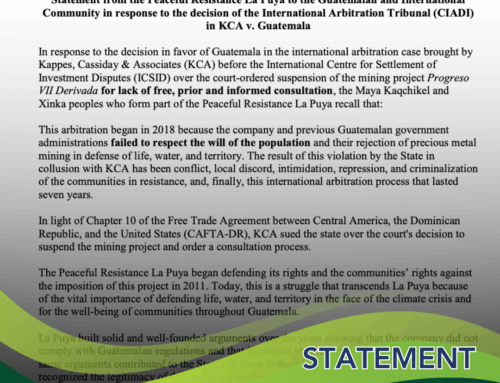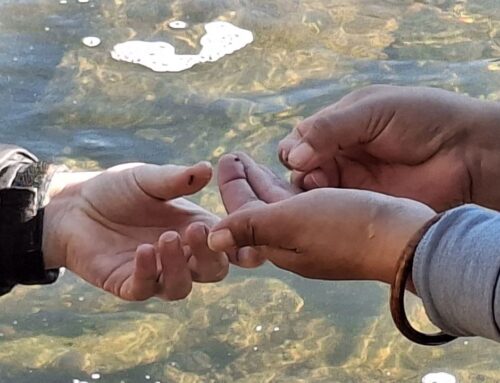
Young Xinka women proudly display traditional dresses adorned with images and names of their municipalities during the celebration of the 8th Anniversary of the Xinka People’s Peaceful Resistance. Photo by NISGUA, June 2025
Today, we commemorate eight years of peaceful resistance by the Xinka People here in Casillas to the Escobal mining project located in San Rafael Las Flores and operated by the transnational company, Pan American Silver. This date represents not only an anniversary, but a symbol of dignity, persistence and collective memory.
The Xinka People, one of the four Indigenous nations of Guatemala, has an ancestral presence in the departments of Santa Rosa, Jalapa, and Jutiapa. According to data from the National Institute of Statistics (INE, 2018), more than 262,000 people self-identify as part of this Indigenous nation. Despite centuries of being made invisible, the Xinka People have not lost connection to their roots, their forms of community organization, nor their connection to the land and water.
The International Labor Organization (ILO) Convention 169, ratified by Guatemala, obliges the State to consult with indigenous peoples before developing projects that affect their territory. Despite this, the mine was imposed without prior consultation.
For our people, mining has meant imposition, conflict, criminalization, and a direct threat to our territories, our water sources and our spirituality. For this reason, today we remember this long and courageous journey.
Since 2009, resistance began with mass peaceful marches and large rallies demonstrating their rejection of the mining project. We have also received support from the Catholic Church with Eucharistic celebrations and have visited the company’s offices to make them aware that our right to free, prior and informed consultation has been violated. Additionally, we initiated administrative legal actions at the Ministry of Energy and Mines to prevent the project from being approved. In the quest to make the voice of the Xinka people heard, we also initiated local votes based on the Municipal Code and the Law for Development Councils, many of which were challenged by the company and Guatemalan business associations. Based on these, we achieved legal resolutions that recognize our people’s right to be consulted.
We also held numerous press conferences so that the community at large would be aware of the actions that Xinka communities were carrying out as part of their right to protest and their right to resist.
Despite these actions, and despite the fact that both the company and the government were aware that the communities outrightly reject the mine, they continued with the approval of the mining license. In fact, the state responded with legal persecution and criminalization of leaders, a state of siege, search warrants and arrest warrants for leaders who opposed the project.
In February 2010, community authorities presented the first legal opposition to the mine to the Ministry of Environment and Natural Resources (MARN), questioning the validity of the Environmental Impact Assessment (EIA) of the mining project. At the same time, we requested a municipal vote for the first time in San Rafael Las Flores, but it was rejected.
On April 29, 2011, more than 10,000 people walked from the centre of the municipality of San Rafael Las Flores to the entrance of the mining project, each person leaving a flower as a symbol of protest. This mass action led by the Catholic Church went down in history as “The March of the Flowers”.
In 2011 and 2012, neighbouring communities such as Santa Rosa de Lima, Nueva Santa Rosa, Casillas and Mataquescuintla held municipal votes with broad participation in which 98% of those consulted rejected the presence of the mine. The people spoke loudly: we do not want mining in our territories.
At the same time, communities held marches, vigils and peaceful demonstrations in streets, parks and roads in the area. On February 20, 2012, close to 2,000 people participated in a public mass in the central park of San Rafael Las Flores, officiated by Bishop Alvaro Ramazzini. It was a spiritual and political act. That day, the mayor-elect made a public commitment to carry out the vote that the community was asking for, however, this never took place.
2013 marked a milestone [in the municipality of San Rafael Las Flores]: a series of community votes were organized in the villages of San Juan Bosco, Volcancito, Los Planes, La Cuchilla, Barrio Oriental, Las Delicias, Renacimiento, El Chanito, and Sabana Redonda. In all but one of them, more than 96% of the population voted against mining.
That same year, the Peaceful Resistance to the Escobal mine was officially established to oppose the installation of the mining project. The state response was not dialogue, but repression. Community leaders were captured and imprisoned as further acts of criminalization. Despite this, the resistance continued.
In May 2013, the government declared martial law in four municipalities: Casillas, San Rafael Las Flores, Mataquescuintla and Jalapa, with the intention of dismantling community organization.
But that same year, in Jalapa and San Carlos Alzatate, more than 94% and 98% of the population rejected mining through municipal consultations.
On June 7, 2017, communities installed the permanent peaceful resistance camp in Casillas. This was a coordinated action by community authorities and the Xinka population to enforce the rulings of the Supreme Court of Justice that recognized the Xinka people’s right to consultation. During that same year, three large mobilizations were held in the capital city, demanding respect for the right to consultation and the Xinka People’s identity. Lastly, in September of that same year, the Supreme Court of Justice recognized the violation of the right to consultation.
On November 6, 2017, we organized a second sit-in, but this time in front of the Constitutional Court to ensure a prompt resolution consistent [with the Supreme Court decision].
On August 20, 2017, the Organized Civil Society of Mataquescuintla installed another peaceful resistance, this time guarding the route to ensure that the company did not continue to operate illegally.
In September 2018, the Constitutional Court issued a landmark ruling: it ordered the State of Guatemala to conduct a consultation with the Xinka People in accordance with international standards, and to suspend operations of the Escobal mining project. This was the first time that this right was formally recognized for the Xinka People.
That same month, as a sign of victory, the sit-in that had been held for 10 months in front of the Constitutional Court was lifted, with the support of multiple social organizations and indigenous peoples.
However, the consultation process was manipulated from the start. In 2019, Xinka authorities publicly denounced that the government was excluding them, violating the ruling of the Constitutional Court and fomenting internal divisions.
In 2020, despite the irregularities, the pre-consultation was officially initiated, as ordered by the Constitutional Court ruling 4785-2027, between the state and Xinka communities.
Now in 2025, after more than 15 years of struggle, and 8 years of permanent peaceful resistance, we reaffirm that this struggle is not only against a mining project, but for the defense of life, water, forests and ancestral territory.
Recently the communities have delivered the results of the consultation process to the central government. Therefore, on the anniversary of the resistance, we send a clear and strong message to the Guatemalan government: it must resolve this issue as soon as possible according to the law and with respect for the results of the consultation process. According to the latest public information, the results reaffirm the people’s decision to NOT give their consent for the restart of the mine, which implies the definitive closure of the mine. As such, as communities in resistance we will be active and alert, monitoring the government’s response.
Now that the results of the consultation process have been returned to the Xinka People, we demand that the State of Guatemala and the courts act with responsibility and legality, that they follow up on this process in strict legal order, guaranteeing justice for the human rights violations committed, the illegalities in the granting of licenses, and the systematic criminalization that we have faced as a people.
Regarding the Catholic Church, its spiritual and pastoral presence has been and continues to be fundamental in sustaining the hope, dignity and the community fabric in the face of structural violence and the imposition of extractive projects.
In these complex times, we need to raise the voice of the church in conjunction with that of the Xinka People, since for some time now we have not had the necessary accompaniment. It is important to recall that this resistance was born out of the population together with the church in defense of life and justice.
Today, here in Casillas, the Xinka People declare that the resistance continues and we recognize the legitimate struggle of the communities. We invite those who are not yet participating to join this peaceful resistance.
We are thankful for the solidarity of the other communities, organizations, indigenous peoples and people from all over the country and the world who have joined this cause.
The resistance is still alive!
We will not yield in the face of impunity, corruption and dispossession!
Our struggle is peaceful, legitimate, ancestral and it continues!
The Xinka People exist and resist!
Casillas, Santa Rosa, June 8 2025






Leave A Comment